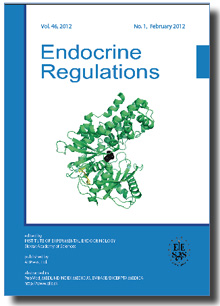Journal info
|
||
Select Journal
Journals
Bratislava Medical Journal Ekologia - Ecology Endocrine Regulations 2015 2014 2013 2012 2011 2010 2009 2008 2007 2006 2005 2004 2003 General Physiology and Biophysics Neoplasma Acta Virologica Studia Psychologica Cardiology Letters Psychológia a patopsych. dieťaťa Kovove Materialy-Metallic Materials Slovenská hudba 2025Webshop Cart
Your Cart is currently empty.
Info: Your browser does not accept cookies. To put products into your cart and purchase them you need to enable cookies.
Endocrine Regulations Vol.46, No.1, p.3-12, 2012 |
||
| Title: Hydroxylated estrogens (2-OH-E2 AND 4-OH-E2) do not activate cAMP/PKA and ERK1/2 pathways activation in a breast cancer MCF-7 cell line | ||
| Author: P. Kwiecinska, A. Ptak, A. Wrobel, E. L. Gregoraszczuk | ||
| Abstract: Objective. The current study was undertaken to determine the involvement of cAMP/PKA and MAPK-mediated signalling pathways in the regulation of cell proliferation by hydroxylated metabolites of 17β-estradiol (E2). Methods. MCF-7, human breast cancer cells, were cultured in phenol red–free DMEM and treated with 1 nM 2-OH-E2 or 4-OH-E2. E2 was used as a positive control. Cell proliferation was measured using the BrdU incorporation assay. Cellular levels of cAMP and PKA were determined using ELISA kits. ERK1/2 protein expression was evaluated by Western Blot analysis. To determine the involvement of different intracellular pathways in the regulation of cell proliferation appropriate activators or inhibitors were used. Results. Hydroxylated estrogens, as E2, exhibited no influence on cAMP accumulation and PKA activation. In concomitant treatments with forskolin, cell proliferation decreased to the amount noted under the influence of forskolin alone. A PKA inhibitor (PKI) had no statistically significant effect on proliferation stimulated by E2 and its hydroxylated metabolites. Phospho-ERK1/2 protein expression in cells stimulated with E2, 2-OH-E2 and 4-OH-E2 was not significantly different from the control. However, co-treatment with both PD98059 and E2 or its hydroxylated metabolites reversed the effect of tested compounds on cell proliferation. Conclusions. We have shown that E2 hydroxylated metabolites do not activate cAMP/PKA in breast cancer cells and confirm previously published data, which showed a lack of ERK1/2 activation in a breast cancer cell line. The observed reversible action of PD98059 on cell proliferation can be explained by the fact that hydroxylated estrogens, as E2, stimulate secretion of a number of growth factors, which affect MAPK activity, suggested by Lobenhofer et al. (2000). |
||
| Keywords: E2 hydroxylated metabolites, cAMP, PKA, ERK1/2, proliferation, breast cancer cell line MCF-7 | ||
| Year: 2012, Volume: 46, Issue: 1 | Page From: 3, Page To: 12 | |
| doi:10.4149/endo_2012_01_3 |
||
|
Price:
20.00 €
|
||
|
|
||

